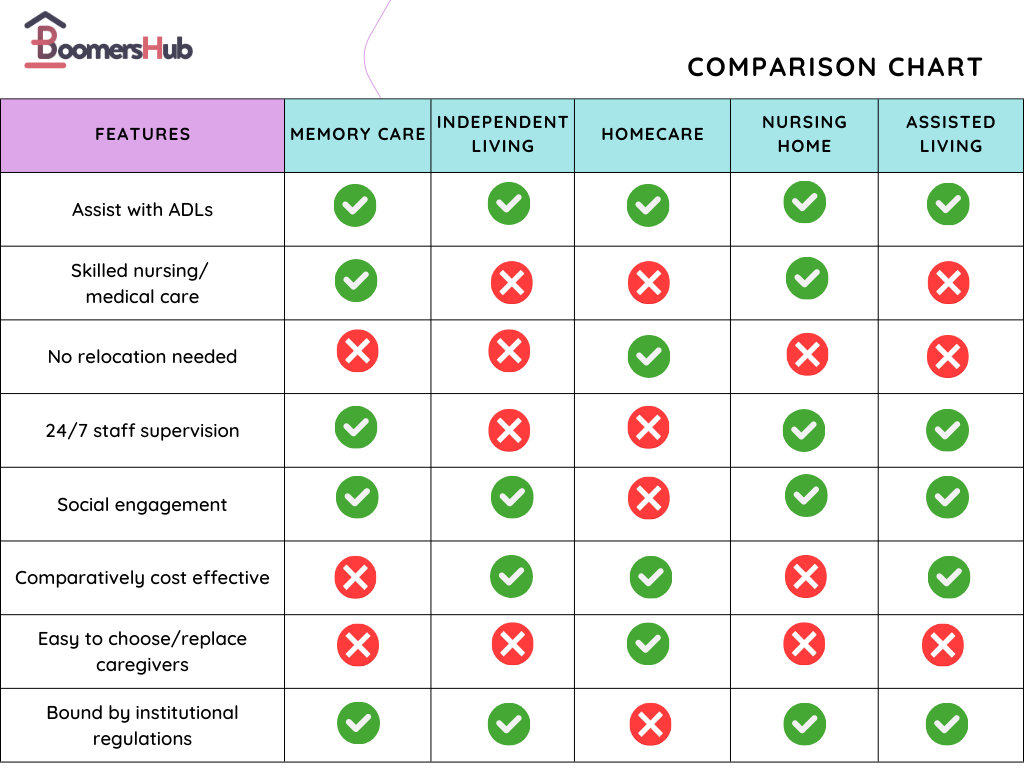Article Contents
It is no secret that our memory can deteriorate as we age, making it difficult to perform daily tasks and remember important events. For some, this decline can be severe enough to require memory care, a specialized form of care that focuses on helping individuals with memory loss maintain their quality of life.
Having said that, memory care can be costly and not always the best option for everyone. Fortunately, there are a variety of alternatives to memory care that can provide similar benefits without the high price tag.
This blog will explore some common alternatives to memory care and discuss their benefits and drawbacks. So, if you want to keep up-to-date with your senior care choices, read on!
What are the pros and cons of memory care?
Before shifting to a memory care facility, it is essential to evaluate the upsides and downsides of the move. So, let’s look at the pros and cons of memory care.
Pros:
- Specialized care for memory impairments
- Trained staff and caregivers provide 24/7 supervision and care
- Provides a secure environment with safety features such as guarded entrances and exits
- Provides an opportunity to socialize with people with shared experiences
- Offers structured daily routines and activities
Cons:
- Can be expensive compared to other types of care
- May feel like a loss of independence for the resident
- Residents may feel isolated from the outside world
- It can take time for individuals to adjust to a new environment, causing stress
- Not all facilities offer the same level of care
What are the alternatives to memory care?
The thought of leaving our homes and moving into memory can be daunting, to say the least. But what if there was an alternative? An option that would allow us to maintain our independence while still receiving the support and care we need? So, let’s explore some alternatives to memory care and their benefits!
1. Memory Care vs Homecare
Homecare can be a great alternative to memory care for those with dementia or other memory-related challenges. It provides the ability to remain in a familiar environment and the flexibility to choose caregivers. In-home care also provides a sense of independence and control over their lives. In addition, it is a much cheaper option than traditional memory care facilities.
While homecare can be a great memory care alternative, it also has some potential challenges. Firstly, it can cause extreme stress and burnout for family caregivers. Second, for those with advanced stages of dementia or Alzheimer’s, homecare may not be enough. Third, a memory care facility may be safer for older adults with wandering or hallucinating tendencies as it provides 24/7 supervision and security.
2. Memory Care vs Assisted Living
Many seniors and their families are unaware that assisted living communities can be an excellent alternative to memory care. Apart from helping with activities of daily living, many assisted living communities have a separate memory care unit designed to care for elderlies with memory issues. These units offer personalized care services and therapy programs. Also, assisted living has daily activities calendars that can help keep your loved one mentally and physically stimulated.
Though assisted living facilities have their advantages, it may not be a good fit for older adults with late-stage dementia or other memory problems – unless the facility has dedicated memory care units. So, it is recommended to do a health assessment before choosing a senior care option.
3. Memory Care vs Independent Living
Another memory care alternative is independent living or retirement communities. This type of senior living community is designed for those who can still live independently but may need assistance with certain tasks, such as preparing meals, housekeeping, etc. Unlike memory care facilities, which are typically more institutional, independent living offers a more home-like environment. Besides, they provide a range of amenities, from fitness centers to social events, and give residents the freedom to live their lives on their terms.
However, for those experiencing memory loss or dementia, independent living may not be the safest or most practical option. While the idea of living alone or with minimal assistance may seem appealing, it’s important to understand the potential risks and limitations that come with it.
4. Memory Care vs Nursing Home
Nursing homes can be a great substitute for memory care. Similar to memory care, nursing homes provide specialized care plans designed to meet the specific needs of the residents. Besides, nursing homes are staffed 24/7 which means that there is always someone available to provide care and support. It is especially important for seniors with dementia who may experience confusion, agitation, or wander off.
While nursing homes and memory care can be viable for older adults with memory problems, they are pretty expensive. Also, they have an institutional feel that may be overwhelming for older adults who prefer more autonomy.

Alternatives to memory care
Some other alternatives to memory care
Apart from the four memory care alternatives mentioned above, there are some other senior care options available as well.
1. Continuing Care Retirement Communities (CCRCs)
Continuing Care Retirement Communities (CCRCs) are a popular choice for older adults offering a range of care options. In CCRCs, residents can move from independent living to assisted living or skilled nursing care as their care needs change. It allows older adults to stay within the same community and access the care they need without having to move to a new location.
2. Respite care
Respite care is a short-term care option that provides temporary relief to caregivers. It can be an excellent choice for those taking care of a family member with cognitive impairments who need a break from their caregiving responsibilities. Respite care can be received at home or in a facility, ranging from a few hours to several weeks.
3. Adult day care
Adult day care is a care option that provides seniors with a safe and stimulating environment during the day. It can be an excellent option for those who can still live at home but need additional support during the day. Adult day care centers typically provide activities, meals, and socialization opportunities, as well as basic medical care and supervision.
Final thoughts
While memory care is a common choice for those with cognitive impairments, it’s important to remember that there are other options available. Each option has unique advantages and disadvantages, from in-home care to assisted living communities to CCRCs.
We hope this blog has shed some light on the alternatives to memory care and has provided valuable information for those seeking solutions for their loved ones. Remember, every senior’s needs are unique, and it’s important to carefully weigh all options before making a decision.
Related articles:
FAQs
- What is the difference between memory care and dementia care?
Memory care and dementia care are two types of specialized care that cater to individuals with cognitive impairments. Although both are often used interchangeably, there are some differences between them.
- First, memory care is a more specific term that refers to care for individuals with memory impairments, while dementia care encompasses care for individuals with all types of dementia.
- Second, memory care is appropriate for people who have mild memory impairment while dementia care is for people who are in an advanced stage of dementia and cognitive decline.
- Finally, in memory care, residents are able to carry out everyday tasks and manage symptoms with assistance from staff and trained caregivers but dementia care patients require comprehensive medical care for a long time.
- How can I ease my memory care transition?
Transitioning to memory care can be a difficult process, but there are steps you can take to make the transition easier:
- Inform your loved ones about the move and involve them in decision-making as much as possible.
- Visit the memory care facility ahead of time and ask questions to better understand what to expect.
- Bring familiar items from home, such as pictures, blankets, or souvenirs to help you feel more comfortable.
- Consider hiring a caregiver or friend to provide additional support and companionship during the transition.
- Work with the memory care facility staff to create a personalized care plan.
- Stay connected to loved ones through phone, video, and regular visits.
- What is a natural way to improve memory?
There are several natural ways to improve memory:
- Exercise regularly as it boosts blood flow to the brain, which can improve memory.
- Eat a healthy, dementia-friendly diet, consisting of fruits, leafy vegetables, fish, and lean protein containing omega-3 fatty acids.
- Lack of sleep can negatively impact memory, so it’s important to get enough rest each night and maintain proper sleep hygiene.
- Challenging the brain with activities like puzzles, reading, and learning new skills can help improve memory.
- Limit alcohol intake as excessive alcohol consumption can negatively impact memory.
- How long do most people live in memory care?
The length of stay in memory care varies depending on the individual’s needs and the progress of the disease. However, on average, most people live in memory care for 2 to 3 years.

